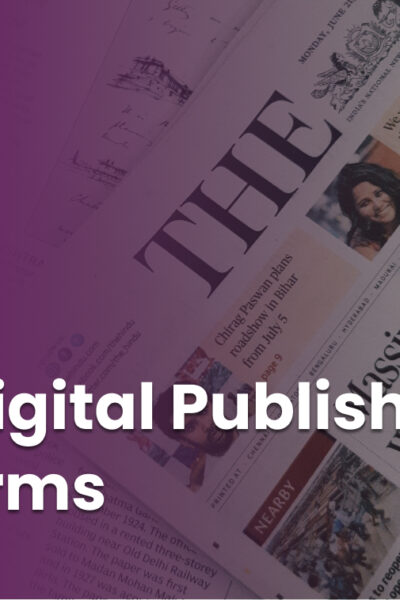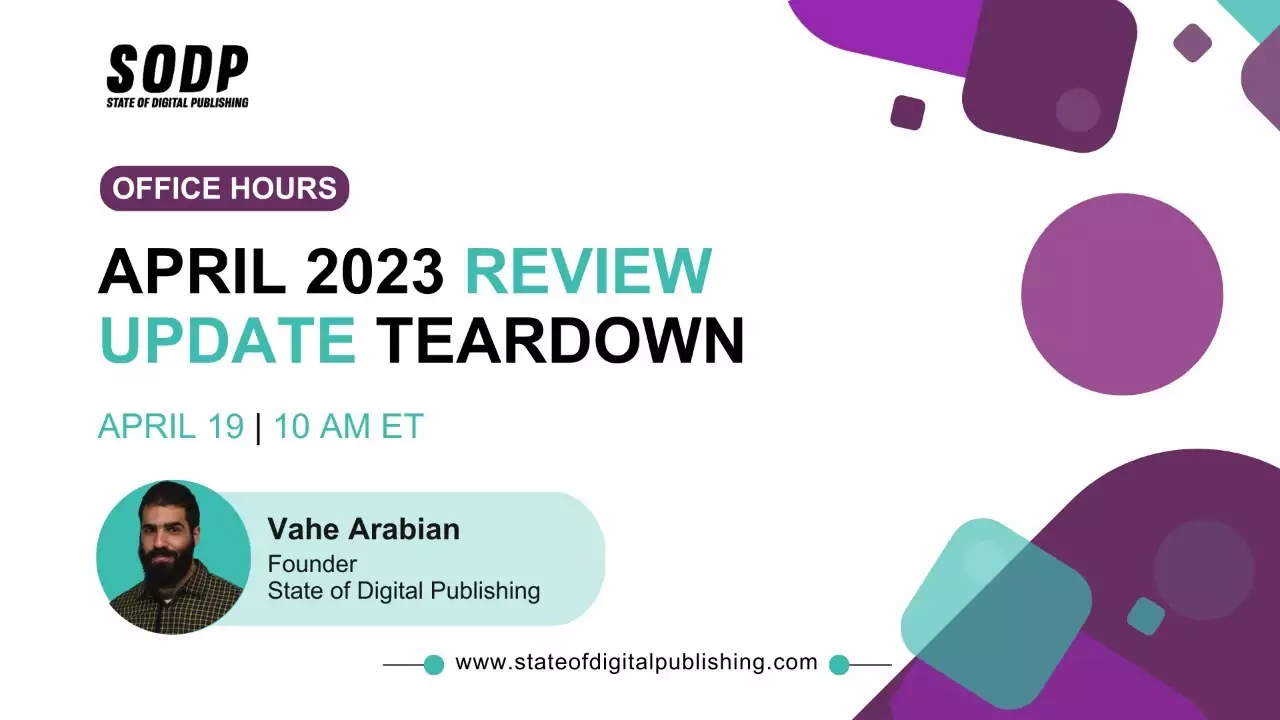What’s been happening in the world of digital publishing over the last week? Here’s your weekly round-up of news, announcements, product launches, and more.
Trends and stats
U.S. Podcast Ad Revenue to Top $2 Billion in 2022, IAB/PwC Study Predicts
Listen to this: The podcast advertising biz is continuing its upward trajectory — with U.S. ad sales expected to grow 47% this year to $2.13 billion, according to a new forecast from trade group IAB and PwC.
That’s actually a deceleration from last year. The sector hit $1.45 billion in 2021, representing 72% annual growth, according to the report. In 2021, U.S. podcast advertising revenue grew twice as fast as the total internet advertising market, which was up 35% last year, according to the 2021 PwC/IAB Internet Advertising Revenue Report. Read more
Why it matters: “According to the latest IAB/PwC podcast report, three key factors are driving podcast ad revenue growth: the ongoing increase in listeners and content; increased use of automated ad tech, as ad revenue served via dynamic ad insertion (DAI) has almost doubled in two years to take 84% share in 2021 (versus ads embedded in podcast audio); and growth of ad spending in categories that historically had lower spend volumes like sports and true crime.”
100k Club: Digital news subscriptions top 30m across largest publishers
The New York Times, Wall Street Journal and Washington Post lead the way with more than 14m subscriptions between them.
And six other companies – Gannett, the New York Times-owned Athletic, the Weather Channel, Substack, The Guardian and the Financial Times – now have one million subscriptions or more. Read more
Why it matters: The world’s largest English-language news publishers now have more than 30m digital subscriptions between them, research from Press Gazette today shows.
Do browser extensions keep anyone away from fake news sites? Maybe a tiny bit
As more companies and platforms adopt ways to figure out whether fact-checking, flagging questionable content, or some other form of alert works best to dissuade people from consuming misinformation, a new study finds that credibility ratings for news sites may offer a tiny ray of hope — if users actually use them.
Overall, the study found that when people installed the NewsGuard extension — which, when installed, provides people with a “green” or “red” rating for a site, with green indicating a trustworthy site — their tendency to focus on largely reliable news sites didn’t really change over the study duration. Read more
Why it matters: “For a lot of interventions for combatting misinformation, effects are often fleeting”
The business of digital publishing
G/O Media, With Quartz in Tow, Eyes an Expansion Years in the Making
The digital media company G/O Media, the publisher of a dozen titles including Gizmodo, Jezebel and Deadspin, turned a profit in 2021 for the first time since its creation three years ago, in large part due to digital ad revenues that rose 53% from 2020.
The publisher saw total revenue rise 45% year over year, though the privately held company, owned by private equity firm Great Hill Ventures, declined to provide specific figures. Read more
Why it matters: “G/O Media, which has no subscription revenue and only a nascent events program, relies almost exclusively on advertising for its revenue generation. Given marketers’ preference for transacting at scale, the publisher will need to increase its reach to remain viable in the cookieless future, said Ameet Shah, partner and global vp of publisher operations and tech strategy at Prohaska Consulting.”
Why The Guardian is betting big on newsletters and ignoring click-throughs
Alongside First Edition, The Guardian has launched ten other in-depth newsletters over the past year. The Guardian now claims to have over a million unique subscribers across its portfolio of 50 newsletters. Read more
Why it matters: The post quotes Guardian head of newsletters Toby Moses: “There’s been this personality-driven news trend recently. And publishers like The Guardian have seen how well it has done.”
Future bags women’s fashion platform WhoWhatWear as it eyes US growth
Publisher Future has nabbed the women’s lifestyle platform WhoWhatWear as it seeks to expand its reach in the US.
Future, which owns titles such as Tech Radar and Marie Claire, has acquired WhoWhatWear from US firm Clique Brands, for an undisclosed sum. Read more
Why it matters: “The deal is set to make Future the sixth largest fashion and beauty publisher in the US, as the media company looks to accelerate “scale and revenue opportunities in the US.”
Big tech
Meta Rethinks News Partnerships as Priorities Shift
Meta Platforms is considering reducing the money it gives news organizations as it reevaluates the partnerships it struck over the past few years, according to people familiar with the matter. The reassessment comes as Meta looks to cut costs broadly and rethinks the value of including news in its flagship Facebook app. Read more
Instagram will begin testing NFTs this week
A group of non-fungible token (or NFT) creators and collectors will soon be able to display their tokens on Instagram. Meta CEO Mark Zuckerberg confirmed in a post that the company is testing NFTs on the platform, with “similar functionality” coming soon to Facebook.
Instagram head Adam Mosseri said in a video that a small group of US users will have the ability to display NFTs on their feed, stories, and in messages. NFT details are displayed in a similar way to tagged profiles and products and are named “digital collectibles.” Clicking on the tag will display details like the name of the creator and owner. Read more
Why it matters: As per the article, “Mosseri emphasizes that support for NFTs on Instagram could help introduce the technology to a broader range of people. Instagram isn’t the first platform to do so: in January, Twitter introduced NFTs on the platform as hexagon-shaped profile pictures.”
Twitter’s new policy highlights its efforts to combat spam and duplicative tweets
Twitter announced that it’s rolling out a new “Copypasta and Duplicate Content” policy to clarify how the platform works to combat spam and duplicative content. For context, copypasta refers to an attempt by multiple individuals to duplicate content from an original source and share it widely.
An example of a violation is identical or near-identical content tweeted by an individual account or several accounts. Another example is a duplicate or copy-pasted tweet that Twitter thinks will “disrupt the experience of others.” Twitter notes that it won’t limit the visibility of retweets or tweets that include existing content alongside unique content or commentary. Read more
Content from our partners
Why it matters: “Twitter notes that duplicative content can also be used to artificially amplify content and possibly manipulate the platform’s Trends and Top Search results.”
Google paying more than 300 EU publishers for news, more to come
Alphabet (GOOGL.O) unit Google has signed deals to pay more than 300 publishers in Germany, France and four other EU countries for their news and will roll out a tool to make it easier for others to sign up too, the company told Reuters.
The move to be announced publicly later on Wednesday followed the adoption of landmark EU copyright rules three years ago that require Google and other online platforms to pay musicians, performers, authors, news publishers and journalists for using their work. Read more
Why it matters: As the article points out, “News publishers, among Google’s fiercest critics, have long urged governments to ensure online platforms pay fair remuneration for their content. Australia last year made such payments mandatory while Canada introduced similar legislation last month.”
SEO
PageSpeed Insights Adds New Lighthouse Speed Metrics
Google’s PageSpeed Insights added two new metrics to the PageSpeed Insights API and UI for Lighthouse. The two metrics are labeled experimental are now being collected for field data while the corresponding lab data can be used for diagnostic purposes. Read more
Google Allows FAQ Structured Data for Non-FAQ Content
Google’s John Mueller answered a question about FAQ structured data that significantly expanded the kinds of content that FAQ structured data can be applied to, which now includes content that isn’t even in the FAQ format. Read more












